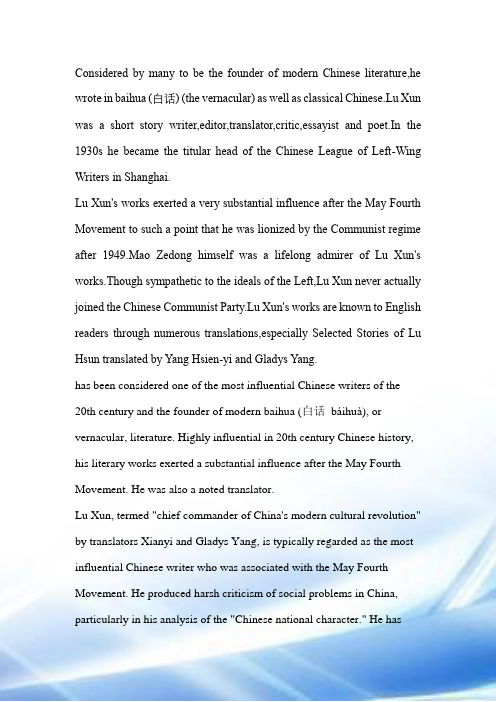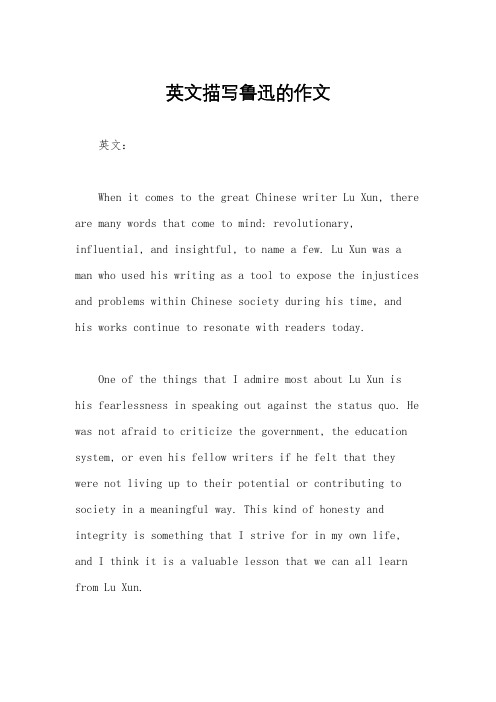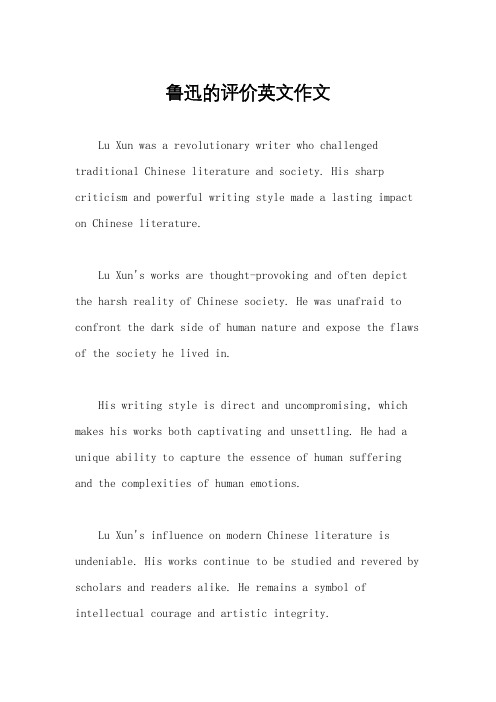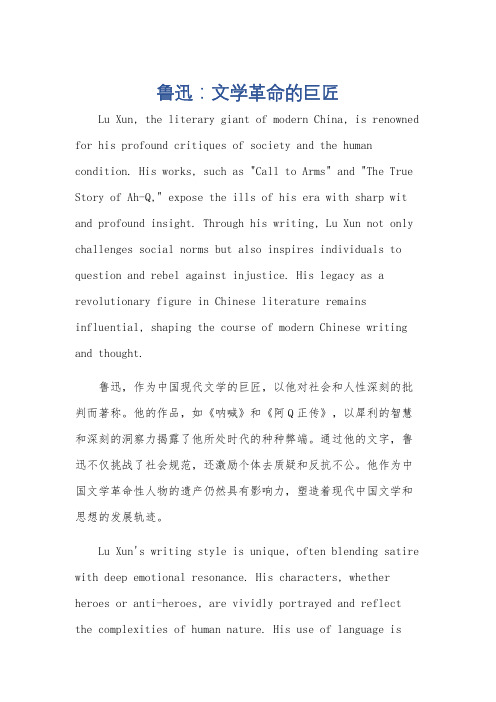鲁迅(英文评论 杂)
鲁迅(英文评论-杂)

Considered by many to be the founder of modern Chinese literature,he wrote in baihua (白话) (the vernacular) as well as classical Chinese.Lu Xun was a short story writer,editor,translator,critic,essayist and poet.In the 1930s he became the titular head of the Chinese League of Left-Wing Writers in Shanghai.Lu Xun's works exerted a very substantial influence after the May Fourth Movement to such a point that he was lionized by the Communist regime after 1949.Mao Zedong himself was a lifelong admirer of Lu Xun's works.Though sympathetic to the ideals of the Left,Lu Xun never actually joined the Chinese Communist Party.Lu Xun's works are known to English readers through numerous translations,especially Selected Stories of Lu Hsun translated by Yang Hsien-yi and Gladys Yang.has been considered one of the most influential Chinese writers of the20th century and the founder of modern baihua (白话báihuà), or vernacular, literature. Highly influential in 20th century Chinese history, his literary works exerted a substantial influence after the May Fourth Movement. He was also a noted translator.Lu Xun, termed "chief commander of China's modern cultural revolution" by translators Xianyi and Gladys Yang, is typically regarded as the most influential Chinese writer who was associated with the May Fourth Movement. He produced harsh criticism of social problems in China, particularly in his analysis of the "Chinese national character." He hasoften been considered to have had leftist leanings. Called by some a "champion of common humanity," he helped bring many fellow writersto support communist thought, though he never took the step of actually joining the Communist Party.Lu Xun was the pen name of Zhou Shuren (September 25,1881 –October 19,1936) is one of the major Chinese writers of the 20th century. He born in 1881 in a family with a deep Confucian background. Owing to the decline of his familyfortunes,Lu Xun’s childhood was filled withhardship. In 1904, he went to Sendai, in Japan,tostudy medicine,but he soon realized that China needed far more"spiritualmedicine”,thantreatment for physical ills.Therefore, he returned to Tokyo in 1906,and decided to give upstudying medicine and devote himself to education and literature.Lu Xun has been consideredas China's greatest modern writer during the 20th century.Chairman Mao called him "commander of China's cultural revolution" .鲁迅是作家周树人的笔名,生于1881年,其家庭有深厚的儒家背景(Confucian background)。
英语介绍鲁迅带翻译

英语介绍鲁迅带翻译Introduction to Lu Xun。
Lu Xun (1881-1936) was a renowned Chinese writer, thinker, and social activist. He is considered one of the most important figures in modern Chinese literature and culture. His works, which include essays, short stories, and novels, are known for their powerful social critique and their exploration of the human condition.Lu Xun was born in Shaoxing, a small town in Zhejiang Province, China. He grew up in a family of scholars and officials, and received a traditional Confucian education. However, he was also exposed to Western ideas and literature, which had a profound impact on his thinking and writing.In 1918, Lu Xun published his first collection of short stories, "Call to Arms," which marked a turning point in Chinese literature. The stories, which were based on hisown experiences and observations, exposed the corruption, cruelty, and hypocrisy of Chinese society and its ruling class. They also portrayed the suffering and struggles of ordinary people who were oppressed by the system.Lu Xun's later works, such as "The True Story of Ah Q" and "The Diary of a Madman," continued to challenge and subvert the dominant ideologies and values of his time. He was a fierce critic of Confucianism, which he saw as a tool of oppression and superstition, and advocated for a new, modern, and rational culture that would liberate the Chinese people from their backwardness and ignorance.In addition to his literary achievements, Lu Xun was also a prominent social activist and intellectual. He was involved in various political and cultural movements, including the May Fourth Movement, which sought to modernize China and promote democracy and science. He also worked as a teacher, editor, and translator, and was a mentor to many young writers and thinkers.Lu Xun's legacy continues to inspire and influencegenerations of Chinese writers, artists, and activists. His writings and ideas are still relevant today, as China faces new challenges and struggles for freedom, justice, and human dignity. As Lu Xun once wrote, "Hope is like a path in the countryside. Originally, there is no path. But as people walk this way again and again, a path appears."。
英文描写鲁迅的作文

英文描写鲁迅的作文英文:When it comes to the great Chinese writer Lu Xun, there are many words that come to mind: revolutionary, influential, and insightful, to name a few. Lu Xun was a man who used his writing as a tool to expose the injustices and problems within Chinese society during his time, and his works continue to resonate with readers today.One of the things that I admire most about Lu Xun is his fearlessness in speaking out against the status quo. He was not afraid to criticize the government, the education system, or even his fellow writers if he felt that they were not living up to their potential or contributing to society in a meaningful way. This kind of honesty and integrity is something that I strive for in my own life, and I think it is a valuable lesson that we can all learn from Lu Xun.Another aspect of Lu Xun's writing that I appreciate is his use of symbolism and metaphor to convey deeper meanings. For example, in his famous short story "The True Story ofAh Q," he uses the character of Ah Q to represent the common people of China who were oppressed and marginalized by those in power. Through Ah Q's experiences, Lu Xun is able to shed light on the larger societal issues that were affecting China at the time, and his message still holds relevance today.Overall, Lu Xun's legacy as a writer and social criticis something that I greatly admire. His willingness tospeak truth to power and his ability to use language to convey complex ideas and emotions continue to inspire meand countless others.中文:提到伟大的中国作家鲁迅,有很多词语会浮现在脑海中,革命性的、有影响力的、富有洞察力的等等。
评价鲁迅英文作文

评价鲁迅英文作文英文,As a Chinese literature enthusiast, I have always been fascinated by the works of Lu Xun. His English essays are not only thought-provoking, but also deeply moving. One of his most famous essays, "A Madman's Diary," is apowerful critique of traditional Chinese society and its oppressive social norms. In this essay, Lu Xun uses the metaphor of a "madman" to convey his own feelings of alienation and disillusionment with the world around him. His use of vivid imagery and powerful language makes the essay a compelling read, even for those who are notfamiliar with Chinese culture.Another one of Lu Xun's essays that I find particularly impactful is "The True Story of Ah Q." In this essay, LuXun portrays the character of Ah Q as a symbol of the weakness and moral decay of Chinese society. Through Ah Q's tragicomic experiences, Lu Xun exposes the hypocrisy andself-deception that he sees as pervasive in Chinese culture. The essay is a scathing indictment of the social andpolitical conditions of the time, and it continues to resonate with readers today.Overall, I believe that Lu Xun's English essays are not only important works of literature, but also valuable insights into the social and political climate of early20th century China. His ability to convey complex ideas and emotions through his writing is truly remarkable, and his essays continue to be relevant and thought-provoking today.中文,作为一个中国文学爱好者,我一直被鲁迅的作品所吸引。
对鲁迅评价英文作文

对鲁迅评价英文作文英文:When it comes to Lu Xun, I have mixed feelings. On one hand, I admire his literary talent and his contribution to modern Chinese literature. On the other hand, I feel uncomfortable with some of his political views and his attitude towards certain social groups.First of all, Lu Xun is undoubtedly one of the greatest writers in modern Chinese history. His works, such as "The True Story of Ah Q" and "A Madman's Diary," are not only masterpieces of literature, but also insightful social commentaries. He used his pen to expose the dark side of Chinese society and to criticize the ruling class and the traditional culture. His writing style is concise, powerful, and full of irony and satire. As a writer myself, I can't help but admire his talent and his influence on Chinese literature.However, Lu Xun's political views and his attitude towards some social groups are controversial. He was a leftist and a socialist, and he believed that only a revolution could save China from its misery. He also had a strong sense of nationalism and anti-imperialism. While I respect his political beliefs, I don't agree with all of them. I think that revolution is not always the best solution to a country's problems, and that nationalism can sometimes lead to chauvinism and xenophobia.Moreover, Lu Xun had a critical attitude towards some social groups, such as women and the lower classes. He believed that women were oppressed by the patriarchal society and that the lower classes were ignorant and superstitious. While there is some truth to his observations, I think that he sometimes overgeneralized and stereotyped these groups. As a feminist and a social activist, I believe that everyone deserves equal rights and respect, regardless of their gender or social status.In conclusion, Lu Xun is a complex figure who deserves both admiration and criticism. His literary talent and hissocial commentary are undeniable, but his political views and his attitude towards certain social groups are not without flaws. As a writer and a reader, I appreciate his contribution to Chinese literature, but I also try to be critical and independent-minded.中文:谈到鲁迅,我有复杂的感受。
鲁迅(英文评论-杂)

鲁迅(英文评论-杂)Considered by many to be the founder of modern Chinese literature,he wrote in baihua (白话) (the vernacular) as well as classical Chinese.Lu Xun was a short story writer,editor,translator,critic,essayist and poet.In the 1930s he became the titular head of the Chinese League of Left-Wing Writers in Shanghai.Lu Xun's works exerted a very substantial influence after the May Fourth Movement to such a point that he was lionized by the Communist regime after 1949.Mao Zedong himself was a lifelong admirer of Lu Xun's works.Though sympathetic to the ideals of the Left,Lu Xun never actually joined the Chinese Communist Party.Lu Xun's works are known to English readers through numerous translations,especially Selected Stories of Lu Hsun translated by Yang Hsien-yi and Gladys Yang.has been considered one of the most influential Chinese writers of the20th century and the founder of modern baihua (白话báihuà), or vernacular, literature. Highly influential in 20th century Chinese history, his literary works exerted a substantial influence after the May Fourth Movement. He was also a noted translator.Lu Xun, termed "chief commander of China's modern cultural revolution" by translators Xianyi and Gladys Yang, is typically regarded as the most influential Chinese writer who was associated with the May Fourth Movement. He produced harsh criticism of social problems in China, particularly in his analysis of the "Chinese national character." He hasoften been considered to have had leftist leanings. Called by some a "champion of common humanity," he helped bring manyfellow writersto support communist thought, though he never took the step of actually joining the Communist Party.Lu Xun was the pen name of Zhou Shuren (September 25,1881 –October 19,1936) is one of the major Chinese writers of the 20th century. He born in 1881 in a family with a deep Confucian background. Owing to the decline of his familyfortunes,Lu Xun’s childhood was fi lled withhardship. In 1904, he went to Sendai, in Japan,tostudy medicine,but he soon realized that China needed far more"spiritualmedicine”,thantreatment for physical ills.Therefore, he returned to Tokyo in 1906,and decided to give upstudying medicine and devote himself to education and literature.Lu Xun has been consideredas China's greatest modern writer during the 20th century.Chairman Mao called him "commander of China's cultural revolution" .鲁迅是作家周树人的笔名,生于1881年,其家庭有深厚的儒家背景(Confucian background)。
鲁迅的评价英文作文

鲁迅的评价英文作文Lu Xun was a revolutionary writer who challenged traditional Chinese literature and society. His sharp criticism and powerful writing style made a lasting impact on Chinese literature.Lu Xun's works are thought-provoking and often depict the harsh reality of Chinese society. He was unafraid to confront the dark side of human nature and expose the flaws of the society he lived in.His writing style is direct and uncompromising, which makes his works both captivating and unsettling. He had a unique ability to capture the essence of human suffering and the complexities of human emotions.Lu Xun's influence on modern Chinese literature is undeniable. His works continue to be studied and revered by scholars and readers alike. He remains a symbol of intellectual courage and artistic integrity.Despite facing criticism and persecution during his lifetime, Lu Xun's legacy has only grown stronger over the years. He is celebrated as a literary hero who fearlessly spoke truth to power and challenged the status quo.In conclusion, Lu Xun's impact on Chinese literature and society cannot be overstated. His uncompromising writing style and unflinching critique of Chinese society have left an indelible mark on the literary world.。
英语描述鲁迅的作文6句话

鲁迅:文学革命的巨匠Lu Xun, the literary giant of modern China, is renowned for his profound critiques of society and the human condition. His works, such as "Call to Arms" and "The True Story of Ah-Q," expose the ills of his era with sharp wit and profound insight. Through his writing, Lu Xun not only challenges social norms but also inspires individuals to question and rebel against injustice. His legacy as a revolutionary figure in Chinese literature remains influential, shaping the course of modern Chinese writing and thought.鲁迅,作为中国现代文学的巨匠,以他对社会和人性深刻的批判而著称。
他的作品,如《呐喊》和《阿Q正传》,以犀利的智慧和深刻的洞察力揭露了他所处时代的种种弊端。
通过他的文字,鲁迅不仅挑战了社会规范,还激励个体去质疑和反抗不公。
他作为中国文学革命性人物的遗产仍然具有影响力,塑造着现代中国文学和思想的发展轨迹。
Lu Xun's writing style is unique, often blending satire with deep emotional resonance. His characters, whether heroes or anti-heroes, are vividly portrayed and reflect the complexities of human nature. His use of language isboth poetic and colloquial, making his works accessible toa wide audience. Moreover, Lu Xun's commitment to social reform and his belief in the power of literature to effect change are evident throughout his oeuvre.鲁迅的写作风格独树一帜,常常将讽刺与深刻的情感共鸣融为一体。
- 1、下载文档前请自行甄别文档内容的完整性,平台不提供额外的编辑、内容补充、找答案等附加服务。
- 2、"仅部分预览"的文档,不可在线预览部分如存在完整性等问题,可反馈申请退款(可完整预览的文档不适用该条件!)。
- 3、如文档侵犯您的权益,请联系客服反馈,我们会尽快为您处理(人工客服工作时间:9:00-18:30)。
Considered by many to be the founder of modern Chinese literature,he wrote in baihua (白话) (the vernacular) as well as classical Chinese.Lu Xun was a short story writer,editor,translator,critic,essayist and poet.In the 1930s he became the titular head of the Chinese League of Left-Wing Writers in Shanghai.Lu Xun's works exerted a very substantial influence after the May Fourth Movement to such a point that he was lionized by the Communist regime after 1949.Mao Zedong himself was a lifelong admirer of Lu Xun's works.Though sympathetic to the ideals of the Left,Lu Xun never actually joined the Chinese Communist Party.Lu Xun's works are known to English readers through numerous translations,especially Selected Stories of Lu Hsun translated by Yang Hsien-yi and Gladys Yang.has been considered one of the most influential Chinese writers of the20th century and the founder of modern baihua (白话báihuà), or vernacular, literature. Highly influential in 20th century Chinese history, his literary works exerted a substantial influence after the May Fourth Movement. He was also a noted translator.Lu Xun, termed "chief commander of China's modern cultural revolution" by translators Xianyi and Gladys Yang, is typically regarded as the most influential Chinese writer who was associated with the May Fourth Movement. He produced harsh criticism of social problems in China, particularly in his analysis of the "Chinese national character." He hasoften been considered to have had leftist leanings. Called by some a "champion of common humanity," he helped bring many fellow writersto support communist thought, though he never took the step of actually joining the Communist Party.Lu Xun was the pen name of Zhou Shuren (September 25,1881 –October 19,1936) is one of the major Chinese writers of the 20th century. He born in 1881 in a family with a deep Confucian background. Owing to the decline of his familyfortunes,Lu Xun’s childhood was filled withhardship. In 1904, he went to Sendai, in Japan,tostudy medicine,but he soon realized that China needed far more"spiritualmedicine”,thantreatment for physical ills.Therefore, he returned to Tokyo in 1906,and decided to give upstudying medicine and devote himself to education and literature.Lu Xun has been consideredas China's greatest modern writer during the 20th century.Chairman Mao called him "commander of China's cultural revolution" .鲁迅是作家周树人的笔名,生于1881年,其家庭有深厚的儒家背景(Confucian background)。
由于家道中落,鲁迅的童年充满了苦难。
1904年,他去了日本仙台学医,但很快意识到中国对“精神医学”的需要远远超过治疗身体疾病的需要。
因此,鲁迅在1906年回到东京,决定放弃医学,投身于教育和文学事业。
他一直被视为中国20世纪最伟大的现代作家。
毛主席称他为“中国文化革命的主将”。
1.鲁迅是作家周树人的笔名,生于1881年,其家庭有深厚的儒家背景:“笔名” 可译为penname。
句中的“有”可用with来翻译,所以“有深厚的儒家背景”就是:with a deepConfucian background。
2.因此,鲁迅在1906年回到东京,决定放弃医学,投身于教育和文学事业:“投身于”可译为devote oneself to,devote意为“投身、贡献”。
3.毛主席称他为“中国文化革命的主将”:“称”可译为call, call可以跟双宾语,常用表达是call sb. sth.“中国文化革命的主将”可译为commander of China’s cultural revolution。
My favourite writer—Lu XunLu Xun is my favourite writer. He is one of the most famous writers in China. He wrote a lot of literary works.He was thin and not tall. He always wore a long old coat in that time.At first, he wanted to be a doctor and save people’s lives. So he learned medicine, but later he found the Chinese were in sensitive when they faced the oppression of their enemies. So he began to write articles to wake the people up.Lu Xun wrote some famous novels, he attacked the social mores in that time, and in his works, many persons were known very well, such as “Ah Q”“Kong Yi ji”.I like Lu Xun because I also want to be a great writer like him. I likereading and writing, and I often write some articles in my free time. Though I don’t have good literary talent or a large vocabulary, I spend lots of time reading and writing to improve my writing skills.Lu Xun is my hero, I will learn more from him. I believe I can be a great writer like him in the future.Lu Xun is one of the major Chinese writers of the 20th century, who is recognized as the father of Chinese modern novel , and more importantly ,the spirit of Chinese nation. Chairman Mao called him "commander of China's cultural revolution" .All We Know, Lu Xun was the pen name of Zhou Shuren. Because his irony articles pointed out the corruption and inaction of the government ,the politicians tried every means to arrest him. To escape from their watch, Lu Xun changed his writing name frequently. Lu Xun is one of his writing names. Lu Xun, with his pen ,his invincible weapon, fought with enemies for the whole nation ,and was engaged in revealing the ugly side of human nature and arousing patriotic consciousness of people.At first, he wanted to be a doctor, so that he can save people’s lives.When Lu Xun was 21, he went to Japan for further study. He made hismost important decision during this period. But when he saw a movie, he changed his mind totally. In that movie, when Japanese was killing Chinese , other Chinese people seemed to expect the bloody scene, when their compatriots was about to be killed! “they are like ducks which stretch out their necks and wait for their own death” ,written by Lu Xun.“To save our country and people, save the thought is the first mission.” He wrote in an article. From then on, he stopped his medical study and started writing , with the hope that literature can eliminate the ugly nature of Chinese .He wrote a number of literary classics, including “A Madman's Diary”, the first Chinese modern novel,“The True Story of Ah Q”, the first mature Chinese modern novel,”Kong Yiji”and “Medicine”, which exposed the ugly side of human nature and emancipated people's minds.His works also influenced our generation greatly. When we were little children, we usually wrote an article like this” though he is thin and short, his image is strong in my heart.” We never knew why we wrote something like that. Now let me tell you the reason. It is because Lu Xun once wrote an article, in which he wrote “when he stepped away ,his thin receding figuregrows stronger and stronger.”He exists in every corner of my life. He is not only a famous writer. He is not a man who only lived in the history. But he is a remarkable star which emits light and heat in our history and modern time. He is a mirror which reminds us to reflect our social problems.He is an external spirit which stimulates us Chinese to fight for a bright future.。
